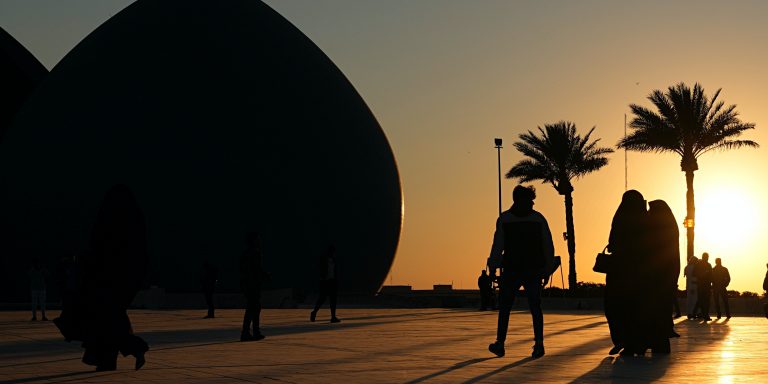INTELBRIEF
April 14, 2022
IntelBrief: Attacks Escalate Amid Baghdad’s Political Deadlock

Bottom Line Up Front
- Iran and the militias to which it provides backing and support have escalated attacks in an effort to influence the formation of a new national government in Iraq.
- Iraq’s Kurdish leaders are at odds over which faction will control Iraq’s presidency.
- Iraqi factions aligned with Iran have blocked efforts by popular Shia cleric Moqtada Al Sadr to form an Iraqi government that marginalizes them.
- Tehran and its allies in Iraq will not shrink from the further use of violence to achieve political objectives.
Iraq is experiencing political deadlock six months after October 2021 national elections, whose results seemed set to reduce the influence of Iran-backed factions and their militia forces that act outside the chain of command and the state structure. However, the leaders of pro-Iranian groups in Iraq have thus far succeeded in blocking the formation of a government that excludes them from key government posts and roles in national decision-making. The militias appear to be taking advantage of the political crisis in Baghdad to attack their adversaries, asserting that no Iraqi leader will be able to bring them under government authority or hold their commanders accountable. The political crisis worsened in early April when the Iraqi Council of Representatives (CoR), elected in October, continued to deadlock on the choice of a president, which, by informal agreement among major blocs, is to be a Kurdish leader.
The government formation process has stalled in part because the two main Kurdish parties that rule northern Iraq have gravitated toward opposing national coalitions, abandoning their past pattern of forging joint positions when dealing with Iraq’s Arab leaders. The Patriotic Union of Kurdistan (PUK), now aligned with pro-Iranian Iraqi Shias, has nominated Barham Salih, the incumbent, for another term as president. The duties of Iraq’s president are mostly ceremonial, but it is the president who taps a prime minister-designate—by informal agreement, a Shia Arab—to assemble the next government. The Kurdistan Democratic Party (KDP), which in past years joined the PUK in supporting Salih, has instead put forward its own figure, Rebar Ahmed, for president. He currently serves as Interior Minister of the Kurdistan regional government. The KDP’s divergence from the PUK on the presidency reflects the KDP’s membership in the “Saving the Homeland Alliance”—a coalition centered on the Sayeroon party of Shia cleric Moqtada al-Sadr, but which also includes the largest Sunni Arab political bloc. Sadr’s party won far more seats in the October election than did any of his competitors. As a nationalist, Sadr wants to reduce Iranian influence by forming a “majority” government that excludes pro-Iranian groups from key ministerial roles. Sadr’s main opponents—a coalition called the “Coordination Framework”—joins former prime minister Nuri al-Maliki's State of Law party, the militia-wielding factions of the Fatah (Conquest) Alliance, and the PUK. This alliance supports adhering to the governing formula that has prevailed since 2003, which entails a “consensus government” that includes all Shia political blocs, even those aligned with Tehran. A Framework-backed government would not challenge Iranian influence or rein in Iran-backed militia attacks on U.S. forces in Iraq that are assisting Iraq government forces against the Islamic State.
The Coordination Framework alliance has thus far been able to block Sadr from achieving the CoR quorum needed to vote in Rebar Ahmed as president. Since no president was chosen by a constitutional deadline of April 6, the CoR has the option, by a two-thirds vote, to disband and trigger new national elections. Instead of pushing for new elections, Sadr has instead directly challenged his opponents by giving the Coordination Framework a 40-day period (until mid-May) to nominate and achieve CoR confirmation of a president, prime minister, and a cabinet. Sadr apparently assesses that his opponents will fail to assemble the necessary majority to install a new government, compelling them to yield to his preferences. Sadr appears confident that, even if new elections are mandated, his party will again be able to demonstrate its political strength by prevailing in a new national vote.
Yet, some of Sadr’s opponents do not consider themselves confined to using peaceful parliamentary maneuvers to shift Iraqi politics to their advantage. After losing in the October vote, armed Shia militiamen held demonstrations in Baghdad to support their accusations that they lost due to fraud, and some appeared poised to try to storm the seat of government. In early November, Iran-backed militias used armed drones to attack the residence of Prime Minister Mustafa al-Kadhimi, who supports the U.S. military presence in Iraq. On April 6, the latest deadline for the selection of a president, three rockets purportedly fired by Iran-backed militia forces targeted an oil refinery in Erbil operated by the KAR group, a Kurdish energy firm. The attack came a few weeks after the Islamic Revolutionary Guards Corps (IRGC) fired a barrage of missiles from Iranian territory on the home of the company’s CEO. The IRGC publicly claimed responsibility for that assault, which it said targeted Israeli interests in Iraq, even though no connection between KAR and Israel was evident. The attacks on targets in Erbil, which is the power base of the KDP, might represent an effort by Iran and its Iraqi allies to compel the KDP to abandon its alliance with Sadr.
On April 7, Iran and its acolytes appeared to expand their campaign when Iran-backed fighters in Syria—who cooperate closely with Iraqi Shia militias—conducted an artillery attack on the “Green Village” base in eastern Syria that is used by U.S. troops, injuring military personnel. The latest attacks triggered a conversation between Iranian Foreign Minister Hossein Amir-Abdollahian and Iraqi Foreign Minister Fouad Hussein on April 8, including agreement for a future in-person meeting. Beyond Iran’s acceptance of future discussions, Tehran and its allies have given no indication that they will abandon a key component of their strategy: the use of acts of violence to pressure political figures, entities, and countries that oppose Iranian influence inside Iraq.